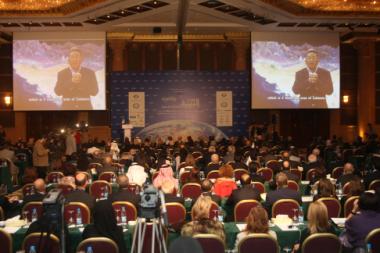Second annual AFED conference in Beirut

By Patrick Galey, The Daily Star
Beirut 19-11-2009
The second Annual Conference of the Arab Forum for Environment and Development (AFED) got under way in Beirut on Thursday with a dire warning: We are not doing enough to prevent catastrophe.
With less than three weeks to go before the COP15 climate change summit in Copenhagen, diplomats, policy makers and academics from across the Arab region convened to tackle the issue of global warming.
As secretaries of state from the Gulf, North Africa and Europe assembled in the lavish conference hall at Beirut's Habtoor Hotel, environmental experts warned that the effects of climate change could devastate the Arab region if carbon emissions continue unchecked.
Dr. Mostafa Kamal Tolba, AFED Board of Trustees president and co-editor of the report, Impact of Climate Change on Arab Countries, said that far greater effort was required of Arab leaders to tackle environmental damage.
"The report for this year reveals a top priority for the whole world, especially given that the Copenhagen summit is happening soon," he said. "Every country in the world will suffer from climate change."
Although the Middle East and North Africa (MENA) region produces only 5 percent of global carbon emissions, experts warned the area will be especially devastated by projected rises in air and sea temperatures.
AFED is an initiative of Lebanon's Environment and Development magazine, whose publisher and editor in chief Najib Saab co-wrote the report with Tolba.
Dr. Rashed Bin Fahed, the United Arab Emirates environment and water minister, said the issue must be treated as a higher priority by Arab nations.
"There is no doubt climate change today is a fact. It's true that our region is not contributing to this. However, the threats of climate change to our region maybe very dangerous," he said. "We need a long term plan because the Arab region is facing many threats.
"We all know our government will pay a high cost, but in the future governments will pay a higher cost still."
Niels Pultz, Denmark's Foreign Minister's Special Envoy on Climate Change said that any deal on curbing emissions would need international cooperation.
Labeling global warning "the challenge of our time," Egebo called on the Arab world to be a key participant in negotiations.
"We need your support and help. Our aim is an agreement that will set the world on track. To achieve this, all countries must be part of the effort, respecting the principle of a common but differentiated responsibility," he said.
the Copenhagen conference is seeking to draw up a legal framework binding countries to commit to various curbs on their respective CO2 emissions.
"We cannot do half at Copenhagen and postpone the rest until later," said Egebo. "The agreement will cover all the key issues. We do not share the view it is possible to do some part of the commitment and not the other. We need the commitment, we need the figures and we need the action."
The conference was held under the patronage of President Michel Sleiman. In a statement delivered to attendees, Sleiman stressed that action against climate change required international cooperation.
"The diversity of participants [at the conference] highlights the international nature of environmental issues," he said. "Our Arab region, as a part of the earth, is suffering from the negative impact of climate change [such as] scarcity of drinking water ... and the decrease of fertility of land. This is not simple exaggeration; it is fact."
Sleiman's statement referred to the issue of water management in Lebanon and criticized Israel for damaging the country natural reserves.
"Israel has insistently exploited the use of our water for decades. We need to double our efforts to maintain our water resources," he said.
Sleiman also cited the bombing of the Jiyyeh power plant and Israeli cluster bombs as examples of Israeli environmental damage to Lebanon.
Thursday's opening featured a presentation from a pan-Arab group of high-school students, who spoke about green initiatives and the importance of preserving natural resources for future generations.
Reine Shreiha, 16, from Al-Mawakeb School in Barja, said that a youth contingent at the conference was vital.
"Without the youth taking part in any of this, you can't take it for granted that generations to come won't take the same actions as [the current generation]," she said. "The way we are living now is catalyzing [climate change]. If we don't act now, we can't even imagine what will happen."
A speech by Suleiman al-Herbish, director general of the OPEC fund for international development (OFID) was interrupted by protesters from Lebanese environmental NGO IndyACT, who stormed the stage and unfurled a banner, which read: "Arabs are more than oil."
The gesture emphasizes the challenge facing the oil producing nations of the MENA region. The Gulf alone accounts for a third of the world's crude oil production - exporting roughly 18 million barrels a day - and Herbish stressed that weaning the region onto more sustainable energy forms would not be easy.
"This sort of [nonrenewable] energy permitted development for the last 100 years, so moving away from it will be difficult."
Tolba criticized Arab governments for not tackling the issue of climate change seriously enough.
"We have no Arab policies that are current; in fact, to handle the impact of climate change we have no long term plans," he said. "Efforts from our ministers and ministries are not sufficient at all. We acknowledge that we [humans] are the cause of the problem, but what about the future?
"We need to cooperate on an international level; there's no other alternative."

